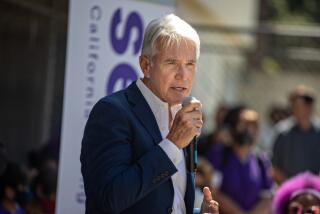Cochran Plans Suit in Police Slaying of Actor
Actor Anthony Dwain Lee and others were laughing at a joke near the end of a Halloween party when a police officer shined his flashlight at them through a glass door and fired nine shots as Lee turned toward the light, holding a fake gun, lawyer Johnnie L. Cochran Jr. said Tuesday, based on witness interviews.
Cochran said Los Angeles Police Officer Tarriel Hopper acted recklessly in the fatal shooting of Lee, and announced Tuesday that he was representing Leeâs family in a wrongful death lawsuit against the department.
Cochran said he based his allegations on extensive interviews with two men who saw the shooting. Both were standing next to Lee in the small ground-floor bedroom of the Benedict Canyon mansion just after 1 a.m. Saturday when Officer Hopper came around the back of the house and looked in on them through a door with glass windows, Cochran said.
Hopper, 27, who has been an LAPD officer for three years, told authorities he saw Lee pointing what appeared to be a semiautomatic handgun at him, and shot the 39-year-old actor out of fear for his life.
On Tuesday, police officials said investigators have interviewed several partygoers who corroborated Hopperâs contention that Lee was pointing a gun at the officer.
LAPD officials declined to respond to Cochranâs allegations that Hopper was acting recklessly or that he helped to precipitate the shooting, saying it was too early in the investigation. But officials did not contradict Cochranâs description of Hopperâs actions preceding the shooting.
Cochran said the witnesses, whom he declined to identify or make available, told his legal investigator that they were laughing and joking with Lee when they suddenly saw a blinding beam of light coming from outside the house.
Along with Lee, they turned toward the light to see who was pointing the flashlight at them. One witness heard Lee say, âHey, whatâs up?â right before gunfire punctured the glass and struck Lee, who slumped to the floor, Cochran said.
âYou shine a light and when people turn, you start firing. Thatâs what happened,â Cochran said, describing Hopperâs actions. âThese other people are blessed. With nine shots being fired, theyâre blessed all of them werenât killed.â
âIâm not saying this [officer] went there to kill someone,â Cochran added. But, he said, âThis is certainly a case of gross negligence.â
Since the weekend shooting, LAPD officials have disclosed few details. They have said Lee was aiming an exact replica of a Desert Eagle semiautomatic .357 magnum at Hopper when he was killed.
LAPD Deputy Chief David Kalish confirmed that Hopper was using a flashlight--as all officers do when patrolling at night--in the moments before the shooting. He said he couldnât comment on whether any witnesses told police the flashlight beam might have prompted Lee to make a sudden movement.
âThe bottom line is the individual pointed a gun at the officer. Whether he did because he saw a flashlight or not, we may never know,â said Kalish, commanding officer of LAPDâs West Bureau, which patrols the Benedict Canyon neighborhood.
âAny time there is an event and there are different witnesses there are different perceptions of the events that occurred,â said Kalish.
Cmdr. Sharon Papa, an LAPD spokeswoman, said she hoped the witnesses cited by Cochran âare telling the same thing to our investigators, because the goal of our department and Mr. Cochran is the same, to find out what happened.â
Legal observers said that Cochranâs involvement in the case--and his plans to sue--raise the stakes in the unfolding controversy.
Cochran and the LAPD have clashed in a number of high-profile cases, most recently during the O.J. Simpson murder trial, when the veteran trial lawyer helped to shred the reputation of the departmentâs homicide detectives and its crime lab.
Cochran said he was called into this case by Leeâs sister, Tina Lee-Vogt. Leeâs relatives âfeel this should not have happened,â Cochran said. âMost people feel this should not have happened.â After conducting a preliminary inquiry, Cochran said, he agreed.
The veteran trial lawyer, who recently battled the New York Police Department in the Abner Louima case, said he expects to once again shine a national spotlight on the LAPD.
This time, Cochran said, he expects to examine the training and tactics of Hopper and all LAPD officers, saying Hopperâs actions on the night of the shooting helped propel him into the fatal shooting.
At an afternoon news conference, Cochran said Hopper and his partner, Officer Natalie Humphreys, were brought into the house shortly before 1 a.m. Saturday by a security guard who told them to wait in the kitchen while he retrieved the party hosts.
Humphreys stayed in the kitchen area, Cochran said, but Hopper left shortly after, going outside to the back of the house. Cochran said witnesses told his legal team that Hopper never identified himself as a police officer when he shined his flashlight into the room where Lee and the others were standing.
Chief Bernard C. Parks said earlier this week that Hopper did not have time to give a warning or identify himself before shooting.
Cochran said the party was winding down, and questioned why Hopper insisted on going into the backyard âon a noise complaintâ when the guard was bringing the hosts to him.
Laurie Levenson, a professor at Loyola Law School, said Cochranâs involvement brings even more pressure on the LAPD to aggressively investigate the nationally publicized case.
*
Times staff writer Kurt Streeter contributed to this story.
*
* RAMPART OFFICER TESTIFIES
An LAPD sergeant gives detailed testimony in his defense at Rampart corruption trial. B1
More to Read
Sign up for Essential California
The most important California stories and recommendations in your inbox every morning.
You may occasionally receive promotional content from the Los Angeles Times.










